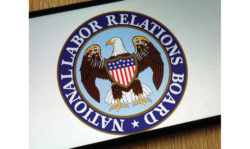Watch your language!
Or not?
Profanity, and whether it has a place in civil discourse — either in the workplace, in public life or on the campaign trail — has become a topic of debate in recent weeks.
On the presidential campaign trail, Democratic candidate Beto O’Rourke, along with others, has made a name for himself for his regular use of profanity especially when talking about hot button topics such as gun control and climate change.
In a Sept. 20 interview with CBS News, for example, the candidate’s wife Amy O’Rourke was quoted as saying that while she cringes when he curses, “At the same time, I think Beto is at his best when he’s just being himself and unfiltered, and speaking honestly and directly.”
The same could be said of union workers who find themselves in tense negotiations with employers. As such, the National Labor Relations Board is reevaluating Obama-era policies that protect employees engaging in union activity from disciplinary action if they use profanity.
The debate centers around how to balance the rights of employees, and protected status under existing legislation, including the National Labor Relations Act and Title VII of the Civil Rights Act of 1964, with employers’ right to take disciplinary action for unacceptable conduct.
On the one side, employer attorneys say the NLRB’s policy goes too far in protecting profane language and want it revised. Employee attorneys counter that workers have a right to engage in activity when negotiating terms and conditions of their employment.
In a notice and invitation to file briefs issued Sept. 5, the NLRB requested input from interested parties on “whether to adhere to, modify, or overrule the standard applied in previous cases in which extremely profane or racially offensive language was judged not to lose the protection of the National Labor Relations Act.”
Taking a step back from this specific case, it’s clear that as our language evolves, so does the need to adjust prescriptive policies around use of such language. Words considered profane a decade ago may have lost some of their impact, especially with increased use of social media and digital forms of communication.
At the same time, workplaces must maintain a level of decorum in order to protect employees from discrimination under Title VII while still promoting honest, open and transparent discourse.
As long as employers have to navigate conflicting guidance on how to apply the NLRA to employee behavior during union activity, and where it intersects with Title VII, the path ahead is unclear.
For employers, putting in place consistent policies and procedures on how to manage and handle such outbursts in the workplace is critical, even while addressing a range of potential situations, from day-to-day interactions to contract negotiations, is challenging.
For employees, too, knowing where the line sits between appropriate and inappropriate behavior and under what conditions profanity crosses that line and gets you fired is important.
Amicus briefs are due Nov. 4. Until then, employers, think carefully before firing workers for foul language.



